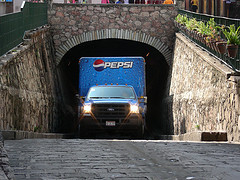Pepsi Scolded For Continued Use Of Controversial Caramel Coloring Considered A Carcinogen In California
The Center for Environmental Health purchased 12 samples of Coke and Pepsi drinks from stores around the nation [PDF]. Only one Coke sample — purchased at a store in Lincoln, NJ — showed any evidence of 4-MEI.
Meanwhile, all of the Pepsi samples showed at least some 4-MEI content. Only two of those samples, both purchased in Oakland, were below the California state labeling threshold. Every sample purchased outside of California had significantly higher levels of the chemical, ranging from 4.4 to 8.3 times the standard set by California.
“We applaud Coke for taking this health protective action for consumers nationwide,” said Michael Green, Executive Director of CEH, in a statement. “Pepsi’s delay is inexplicable. We urge the company to take swift action to provide all Americans with the same safer product they’re selling in California.”
In a statement to NPR’s The Salt, a PepsiCo rep defends the use of 4-MEI and says the company is working to phase out its use by Feb. 2014.
“The FDA and other regulatory agencies around the world, including the European Food Safety Authority and Health Canada, consider our caramel coloring safe for use in foods and beverages,” said the Pepsi rep.
Some public health advocates, like the Center for Science in the Public Interest, have called for the FDA to ban 4-MEI. The FDA, as recently as last year, has maintained that the amount needed to cause cancer is beyond what any human being could reasonably consume.
The American Beverage Association has previously gone on the record saying it believes that 4-MEI is a safe ingredient, in spite of it being linked to cancer in lab tests performed on rodents.
“There is no evidence that 4-MEI causes cancer in humans,” said the ABA last year. “No health regulatory agency around the globe, including the Food and Drug Administration, has said that 4-MEI is a human carcinogen… 4-MEI is virtually ubiquitous, found in trace amounts in a wide variety of foods and beverages. It forms during the heating, roasting or cooking process.”
Want more consumer news? Visit our parent organization, Consumer Reports, for the latest on scams, recalls, and other consumer issues.


